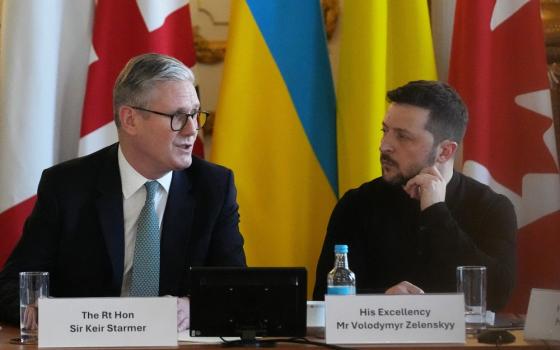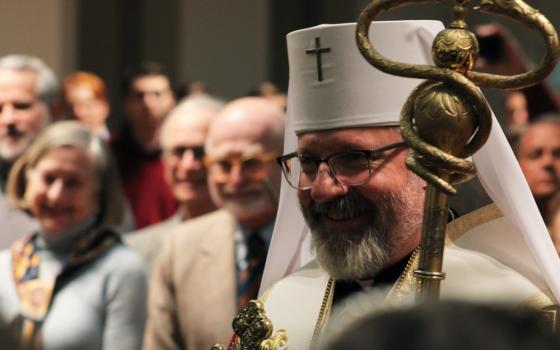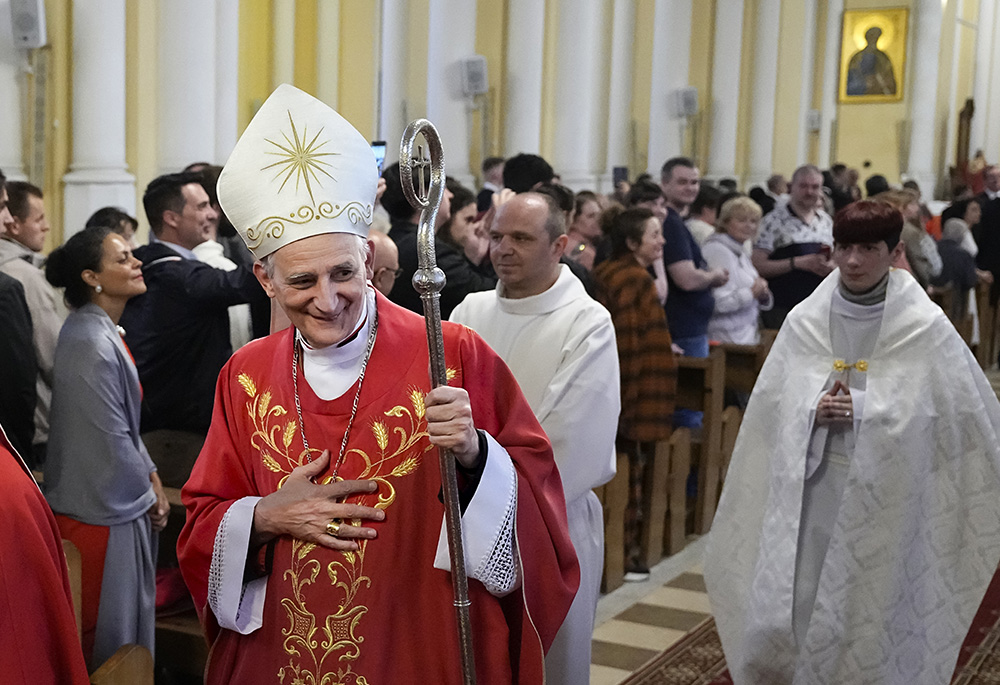
Cardinal Matteo Zuppi greets parishioners after celebrating Mass at the Cathedral of the Immaculate Conception in Moscow June 29. Zuppi's June 28-29 Moscow visit marked the second round of a mission to bring peace to Ukraine. (AP/Alexander Zemlianichenko)
When the president of the Italian bishops' conference headed a Vatican delegation to Moscow in late June, there was intense speculation as to what might result.
Three weeks on, observers await Bologna Cardinal Matteo Zuppi's next step. Doubts remain, not least in Ukraine, as to whether the Vatican should be drawn into attempts to settle a bloody conflict whose outcome looks set to be decided on the battlefield.
"Although I acknowledge the Vatican's efforts, its peace aims seem impossible — when the Russian isn't ready to negotiate, and prefers to bomb and kill as many people as possible," Ukrainian Bishop Stanislav Szyrokoradiuk of Odessa-Simferopol told NCR on July 13.
"As the local church, we've always asked the Holy Father not to act without consulting us. And while we hope his efforts will at least secure the return of Ukraine's prisoners and abducted children, ending this terrible war remains in God's hands alone."
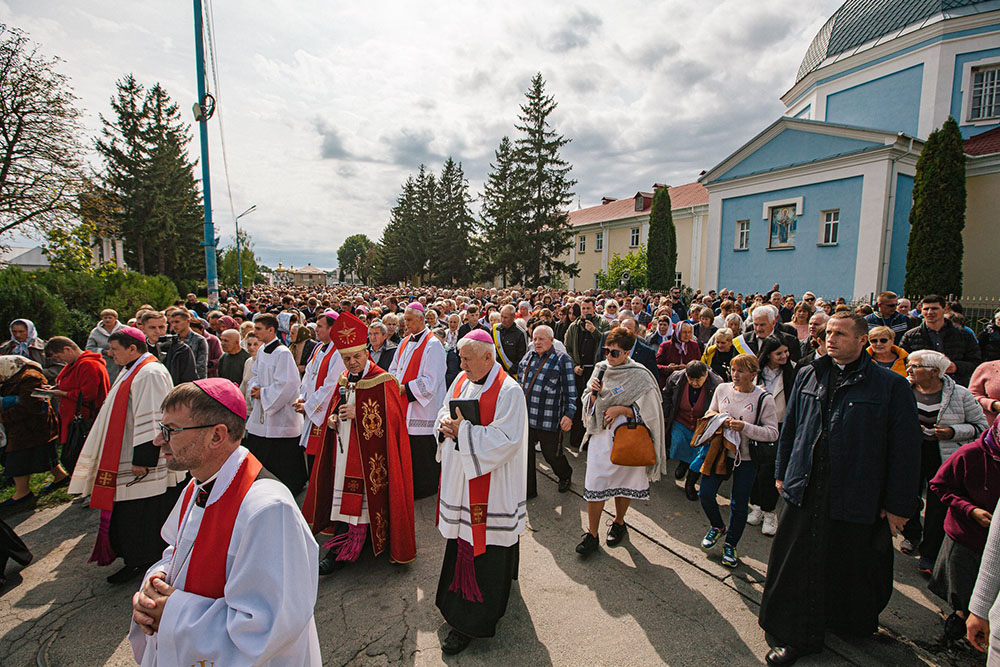
Bishops Leon Dubrawskyi of Kamianets-Podilskyi, wearing red vestments, and Stanislav Szyrokoradiuk of Odesa-Simferopol, center, lead a procession in Shargorod, Ukraine, Sept. 14, 2022, the special day of prayer for Ukraine and the end of the Latin-rite bishops' Year of the Holy Cross. (CNS/Vyacheslav Sokolovy)
Zuppi's June 28-29 Moscow visit marked the second round of a peace mission, first announced by the pope at the end of April.
It had taken him to Kyiv, Ukraine's capital, on June 5-6; and it followed numerous prayerful, but sometimes controversial, appeals by Francis since Moscow's February 2022 invasion of Ukraine, as the pontiff has generally sought to appear impartial. Zuppi has now embarked on a third leg of the peace mission, visiting Washington July 17-19.
Ukraine's embattled president, Volodymyr Zelenskyy, fresh from a Vatican visit on May 13, had ruled out any ceasefire, which he said would merely allow Moscow to rebuild its capabilities. Zelenskyy told the cardinal firmly that Kyiv's peace proposals required prior Russian withdrawal from all occupied territory.
During his three-day stay in Moscow, Zuppi was denied access to President Vladimir Putin or his veteran foreign minister, Sergei Lavrov, meeting instead with Yuri Ushanov, a former ambassador and key Putin adviser.
Zuppi also met Maria Lvova-Belova, Russia's presidential commissioner for children's rights, who, like Putin, is wanted by the International Criminal Court for war crimes.
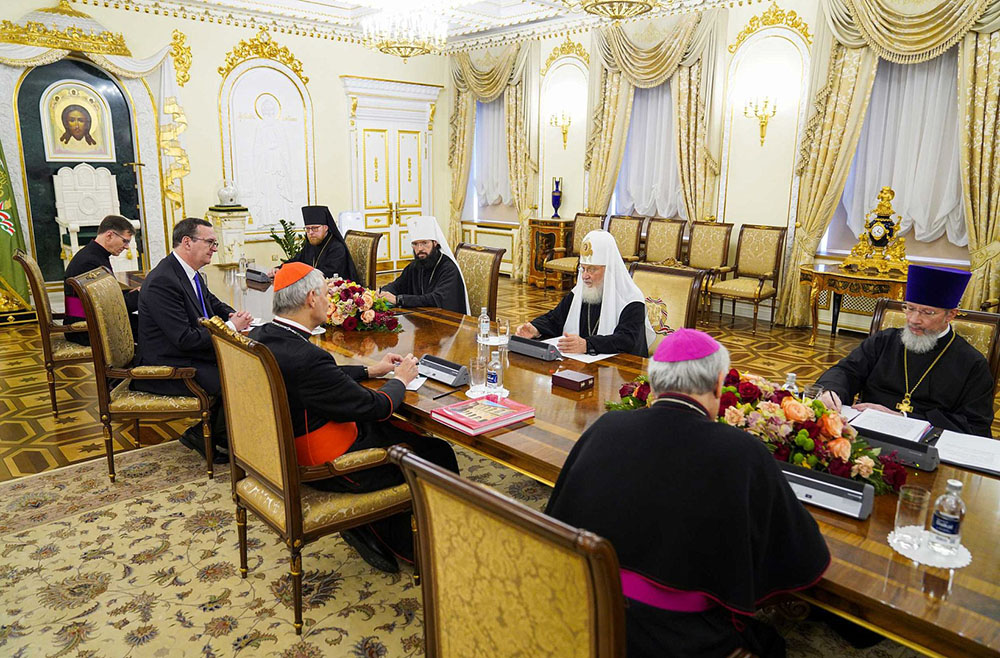
Russian Orthodox Patriarch Kirill of Moscow speaks with Cardinal Matteo Zuppi, on a peace mission to Moscow on Pope Francis' behalf, at his residence at the Danilov monastery in Moscow June 29. (CNS/Courtesy of the Russian Orthodox Church, Department for External Church Relations)
No less controversially, he also held talks with Russia's Orthodox leader, Patriarch Kirill, who has backed the war with messianic enthusiasm, along with his church's foreign relations director, Metropolitan Antony.
"If countries and peoples understand each other, then a realpolitik can be built taking their interests into account," Kirill told the Italian cardinal.
The diplomatic exchanges took place as Ukrainian forces pressed on with a summer counteroffensive, and as Kyiv, Kharkiv, Lviv and other Ukrainian cities remained under daily attack from Russian missiles and drones.
Preaching in Moscow's Catholic Immaculate Conception cathedral before his departure, Zuppi said he had entrusted his Russian visit to the Virgin Mary, adding that the Catholic Church was "not naive," but made "adversity an opportunity for love."
However, the Kremlin's spokesman, Dmitri Peskov, told the TASS news agency that Russia would continue its "special military operation." He added that he saw "no conditions for resolving the situation in Ukraine by political and diplomatic means."
'After so many debatable statements by the pope, Ukrainians no longer believe the Vatican has any serious capacity to affect this war.'
—Iryna Biskub
Speaking on July 2, before briefing Francis on his visit to Moscow, Zuppi insisted he had been pursuing "humanitarian causes and the protection of innocent lives," rather than trying to mediate the conflict.
A "real peace" could still be secured, he added, based "first of all on coexistence." But "dialogue is a canvas that can be woven in different ways — it's necessary to encourage many initiatives to reweave the delicate lace of peace," the cardinal said. "There is no peace plan and no mediation, only a great desire for the violence to stop."
Zuppi's modified claim was repeated by the state-run Vatican News and endorsed by the Vatican's secretary of state, Cardinal Pietro Parolin, prompting speculation that Zuppi's wider peace appeals had been turned down.
Criticism has been strong among Ukrainians, two-thirds of whom have lost family members in the war, and who are now indignant, with so many bridges destroyed both metaphorically and literally, to hear Ukrainians and Russians referred to as "sister-nations."
Advertisement
Iryna Biskub, a Catholic and a linguistics professor at Lesya Ukrainka Volyn National University, said persistent attempts by Francis to reach out to Moscow have created problems for local church members, with Mass attendance dropping in her northwestern home city of Lutsk.
"The peace efforts aren't being taken seriously now — after so many debatable statements by the pope, Ukrainians no longer believe the Vatican has any serious capacity to affect this war," Biskub told NCR.
"Traditionally, the pope has been viewed as a powerful peacemaker. But unless there's a fruitful dialogue with Russia, we don't see how he could have any impact."
Marcin Przeciszewski, director of the church's influential Catholic Information Agency in neighboring Poland, agreed that Zuppi was forced by Ukrainian and Russian rebuffs to switch from mediation to humanitarianism.
Yet he's confident Vatican interventions might still achieve something.
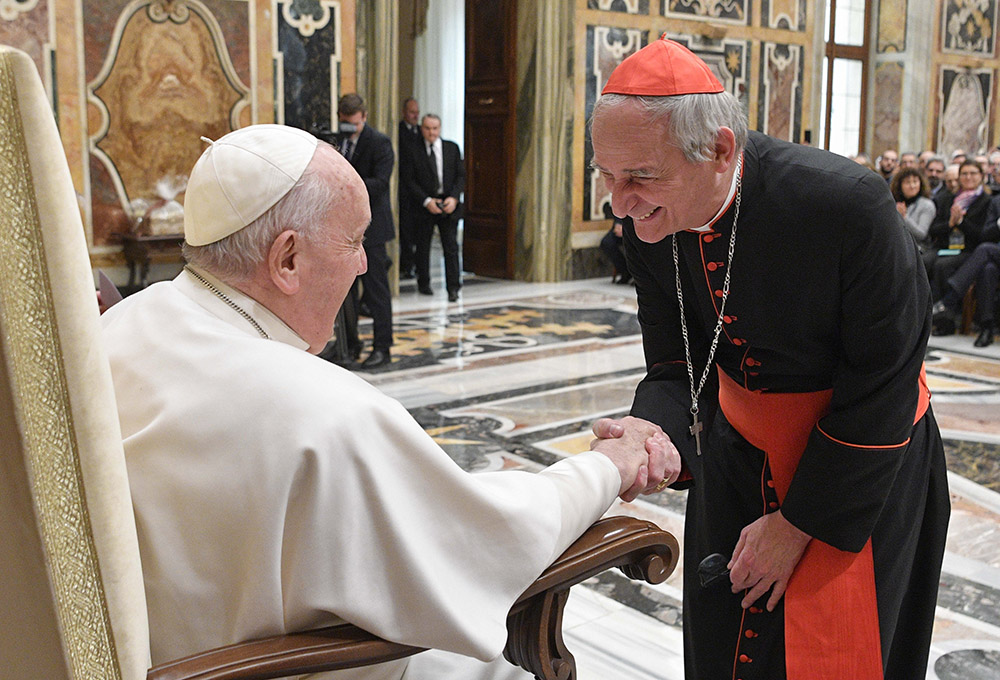
Pope Francis greets Cardinal Matteo Zuppi, president of the Italian bishops' conference, during a meeting with representatives of most of Italy's 227 dioceses in the Clementine Hall of the Apostolic Palace at the Vatican Feb. 16. (CNS/Vatican Media)
"Although I can't know what Pope Francis precisely intended when he dispatched Cardinal Zuppi to Kyiv and Moscow, it seems clear this was an exploratory, sounding-out mission, to grasp what each side was thinking," Przeciszewski told NCR.
"If there were illusions about obtaining some compromise, these have now been given up, since there's been no progress whatsoever on any kind of peace dialogue. Ukraine's precondition, quite rightly, is that Russia must first withdraw from territory it's seized illegally in violation of all international principles — and until it suffers military disaster, Russia will not do this."
For now, Ukrainian church leaders like Szyrokoradiuk remain grateful for the Vatican's practical efforts — not least in helping arrange prisoner exchanges and the hoped-for repatriation of deported children, currently estimated at over 19,000.
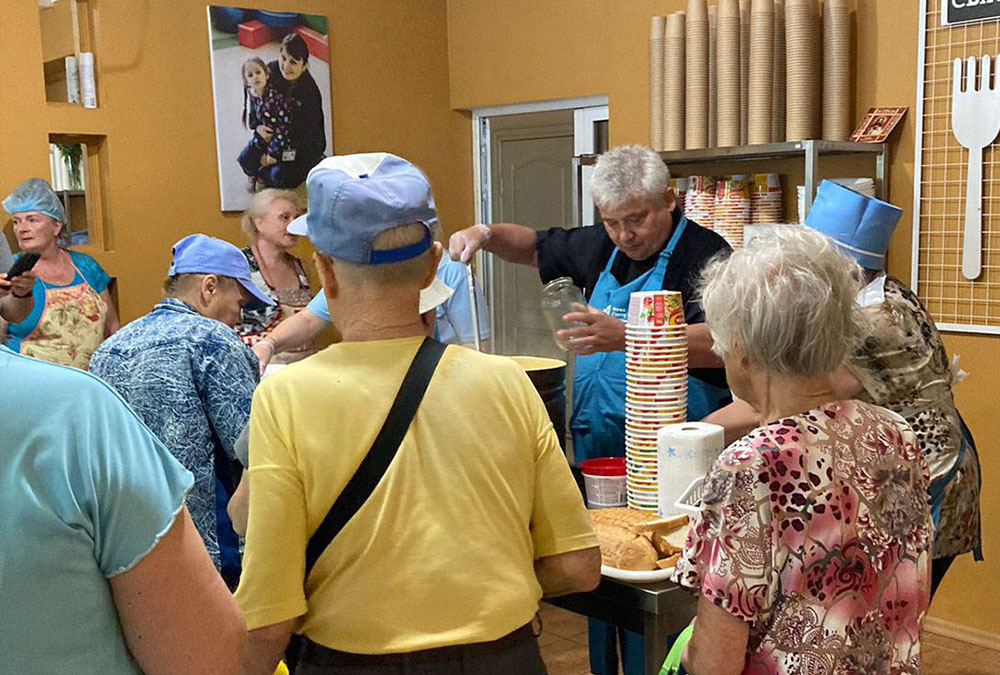
Cardinal Konrad Krajewski, prefect of the Vatican Dicastery for the Service of Charity, in Kherson on June 28, helps distribute humanitarian help to a community flooded after the destruction of the Kakhovka dam on June 6. (OSV News/Courtesy of Bishop Jan Sobilo)
They also value the aid provided by the Polish-born prelate who leads the Vatican's charity office, Cardinal Konrad Krajewski. At the end of June during his sixth "evangelical expedition," Krajewski visited Ukraine's Kherson region, flooded after the June 6 destruction of the Kakhovka dam.
While the war drags on, however, church leaders have stressed that Ukraine can't be "forced into reconciliation" — in the words of Archbishop Sviatoslav Shevchuk, leader of Ukrainian Greek Catholics.
In a late June interview with Ukraine's Glavkom agency, Shevchuk said he understood that, far from "representing moral neutrality," Francis wished to be a "herald of good news to the Ukrainian people," and also understood "who the aggressor and victim are."
Yet many Ukrainians felt the pontiff, for all his diplomatic potential, did not "fully understand their pain," Shevchuk cautioned.
'I think the Vatican has shed any illusions about the Russians, and is acting from a sense of moral duty to do anything to bring peace closer.'
—Marcin Przeciszewski
Przeciszewski, the Polish news director, conceded that there are wider misgivings over Vatican diplomacy — particularly among Eastern Europeans who remember with bitterness Rome's soft-power policy of the 1960s and 1970s, when Popes John XXIII and Paul VI adopted a strategy of appeasement toward communist regimes, believing they could extract concessions through a top-level "small steps" approach.
While some Vatican analysts still view the controversial "Ostpolitik" as an historical success, it's viewed differently in post-communist Europe, where many believe it undermined local bishops and boosted regime legitimacy.
Though some doubt whether talks should be held at all, particularly with Kirill, who faces vilification and isolation, Przeciszewski thinks past comparisons are unfair.
"There were fears a year ago that Rome was again going it alone — but the fact that Cardinal Zuppi went to Kyiv and listened to the Ukrainians first shows he wasn't acting over anyone's heads," the news director told NCR.
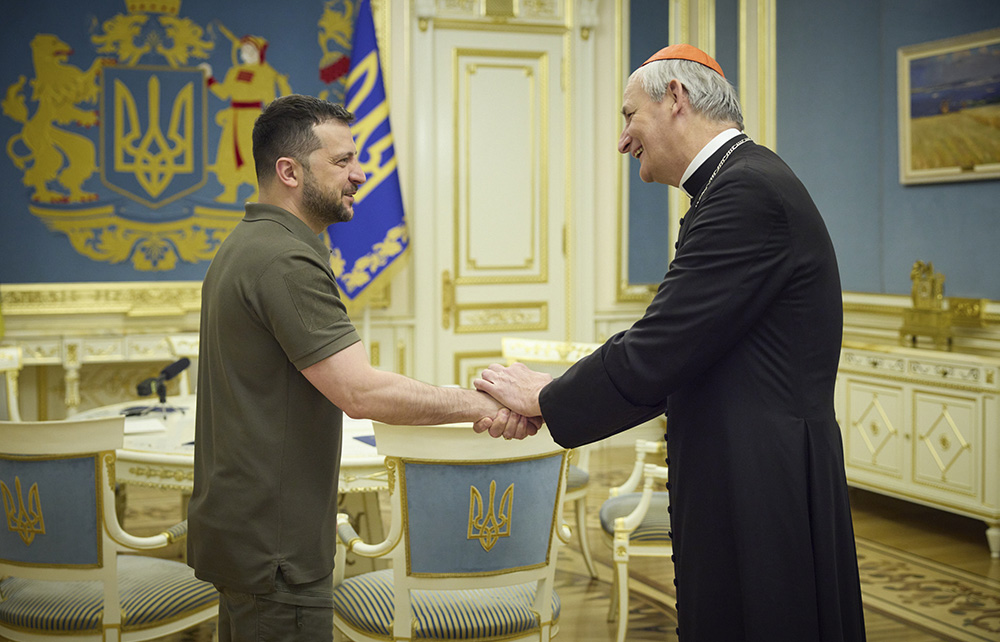
Ukrainian President Volodymyr Zelenskyy, left, shakes hands with Cardinal Matteo Zuppi in Kyiv, Ukraine, June 6, during the first leg of the cardinal's peace mission. (Ukrainian Presidential Press Office via AP)
"As to whether Christians should talk or reach out to the devil, I think in certain situations they should, provided they're not seduced — and I see no evidence that Cardinal Zuppi was being naive or betraying anyone's interests. On the contrary, I think the Vatican has shed any illusions about the Russians, and is acting from a sense of moral duty to do anything to bring peace closer."
For now, at least, the tentative diplomatic forays look set to continue, as other parties, including the Geneva-based World Council of Churches, also pitch in with peace initiatives.
In war-damaged Odessa, Szyrokoradiuk said he and other church leaders were not notified of Zuppi's mission and firmly support the Ukrainian government's position. He said he remains hopeful but deeply skeptical of mediations.
"We're grateful for what Rome is doing — but with a totalitarian power like Moscow, nothing can really be achieved," the Odessa-Simferopol bishop told NCR.
"While diplomatic and humanitarian support is appreciated, what Ukraine really needs right now is massive military assistance," he said. "Although it isn't the church's task to request this, it's what we're praying for most of all."





